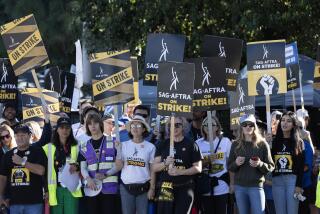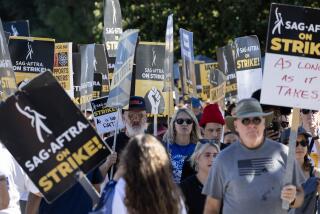Players Make an Offer, Owners Aren’t Thrilled : Baseball: Union’s ideas are a far cry from what the owners want.
SCOTTSDALE, Ariz. — Baseball players made their new offer to owners Saturday, proposing a payroll tax threshold that still left the sides far apart in their efforts to settle the strike.
The union’s offer, according to a person on the players’ side speaking on the condition of anonymity, was for a 25% tax on the portion of payrolls above $54 million.
At that level, 133% of the average payroll, the tax would have affected only two teams in 1994, the Detroit Tigers and the Atlanta Braves. Still, it was another small step as the sides continued their extremely slow move to a midpoint.
“We gave them what we thought they were looking for,” Toronto’s Paul Molitor said. “We’ll find out their response.”
A person with knowledge of the negotiations, speaking on the condition of anonymity, said management’s last unofficial proposal was for a 40% tax on the portions of payrolls above 115%, or about $47 million in 1994.
Owners didn’t have an immediate public reaction. No further meetings were scheduled, but the players planned on remaining in Scottsdale.
Both sides had set a soft deadline of this weekend for a deal that would allow the season to start as scheduled on April 2 with the regular players.
“The ball’s been in their court for a while,” union head Donald Fehr said with irritation in his voice. “They’re still dribbling it around or calling timeout or whatever.”
According to the method of counting both sides are using, the average payroll in 1994 was $40.7 million. Under the union’s proposal, Detroit would have paid a tax of $695,005 on top of its payroll of $56.78 million and Atlanta would have paid a tax of $3,757 on its payroll of $54.02 million.
The union’s proposal for a threshold was $5 million less than its unofficial offer made to mediator W.J. Usery on Feb. 6.
Management’s last formal proposal, made Feb. 1, asked for a 75% tax on the portion of payrolls between $35 million and $42 million, and a 100% tax on the amount above that.
At those levels, 19 teams would have paid a tax last year, topped by Detroit at $20.03 million. The Braves would have paid $17.27 million.
“Players aren’t going to agree to anything that destroys or effectively destroys the free market,” Fehr said.
Players think a high tax at a low level would crush free agency. Owners think it would place the drag on salaries that they seek.
Fehr’s tone Saturday was slightly more confrontational than it had been in recent days.
“Once again, as we’ve seen in the past, meaningful steps by the players are not met with meaningful responses,” he said.
Delegations from both sides met for about 90 minutes during the morning. After that meeting, owners said they still awaited the union’s proposal on the threshold.
“We have a question that’s been on the table. We’re going to stay with that until it gets answered. . . . We’re not going away.” said Colorado Rocky owner Jerry McMorris, who has headed the owners’ delegation since acting commissioner Bud Selig left town Thursday night.
Fehr said the union at first was hesitant to give a threshold number, preferring to discuss how the tax would fit in an overall agreement, including sunset provisions that would phase out the tax. But he gave the union’s latest proposal to McMorris during an afternoon meeting that lasted about 5 minutes.
The level a luxury tax would start at and the rate of the tax are just two of the major areas that players and owners must agree to. The negotiators, for the moment, have left aside free agency and salary arbitration.
Talks to solve the strike, which completed its 205th day, may have to move after today or Monday. Owners are scheduled to be in Palm Beach, Fla., starting Tuesday for three days of meetings.
In addition, the National Labor Relations Board is expected to rule this week on the union’s unfair labor practice charge against owners.
“There’s good reason to believe there might well be another complaint issued this week along with, hopefully, a request for an injunction,” Fehr said.
Players say they would end the 6 1/2-month strike if the NLRB obtains an injunction from a federal judge. An injunction would force owners to restore the old work rules--including salary arbitration, which management wants to end.
More to Read
Go beyond the scoreboard
Get the latest on L.A.'s teams in the daily Sports Report newsletter.
You may occasionally receive promotional content from the Los Angeles Times.










